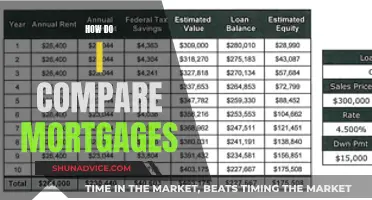
If you're considering a career as a mortgage advisor or broker, it's important to understand the role and its requirements. Mortgage advisors and brokers act as intermediaries between borrowers and lending institutions, helping clients navigate the complex world of mortgages and real estate. While a college degree is not mandatory, a solid foundation in finance, accounting, or business can be advantageous. In the UK, certifications like the Certificate in Mortgage Advice and Practice (CeMAP) are recognised, while in the US, licensure and registration are crucial steps. It's a challenging yet rewarding career, requiring a strong understanding of lending rates, credit criteria, and industry trends. Networking and mentorships can provide valuable insights and enhance your credibility as a mortgage professional.
| Characteristics | Values |
|---|---|
| Education | A high school diploma or GED is required. A college degree is not always necessary, but an associate or bachelor's degree in business, finance, or accounting may improve career opportunities and salaries. |
| Licensing | Mortgage advisors typically obtain licenses to practice. This involves completing a pre-licensure program (around 20 hours) and passing an exam. |
| Skills | Strong communication, negotiation, sales skills, and numeracy are essential. Attention to detail, time management, and flexibility are also important. |
| Training | Training is often provided by employers, especially banks and financial institutions. Training courses and apprenticeship programs are also available through external providers. |
| Certification | The CMA (Certified Mortgage Advisor) certification is the standard of excellence in the industry. The CeMAP (Certificate in Mortgage Advice and Practice) qualification is also widely recognized. |
| Earnings | Earnings depend on location, experience, and type of employment. In the US, the average salary is $170,796, while in the UK, it ranges from £25,000 to £30,000 for full-time employees. |
| Work Environment | Mortgage advisors can work in contact centers, offices, or client locations. They may have irregular hours, including nights and weekends, to accommodate client needs. |
What You'll Learn

Qualifications and skills
The most common and essential qualification for mortgage advisors in the UK is the CeMAP qualification (Certificate in Mortgage Advice and Practice). It is a Level 3 course approved by the Financial Conduct Authority (FCA) and is viewed by employers as the industry standard. The London Institute of Banking and Finance offers this qualification, which consists of three parts that must be completed to become fully qualified. The course can be completed in as little as six months, and you will have 12 months to complete each module and sit the exam. The modules provide an extensive knowledge of UK-regulated mortgage policy and practice and how to apply this when providing mortgage advice.
Other qualifications that can help you become a mortgage advisor include a higher national diploma (HND) and a variety of more general finance postgraduate courses. Specific fields of study that can provide a solid foundation for your career include real estate, finance, business, and accountancy.
While qualifications are important, certain skills are also essential for becoming a successful mortgage advisor. These include excellent commercial awareness, a duty of care to provide the best possible advice, and the ability to build trust with clients. Confidence, determination, and excellent listening skills are also crucial. Additionally, you should have a basic grasp of the mortgage products available and be able to analyse the market to find the most appropriate and cost-effective mortgage for your client.
Applying for Mortgage Relief: A Step-by-Step Guide
You may want to see also

Salary expectations
As a mortgage advisor in the UK, you can expect to earn an average annual salary of £41,128. However, salaries can vary depending on experience and other factors, with some sources stating that experienced mortgage advisors can earn between £45,000 and £75,000 per year. Higher-end salaries may include commissions.
To become a mortgage advisor, you'll need to obtain certain qualifications recognised by the Financial Conduct Authority (FCA), such as the Certificate in Mortgage Advice and Practice (CeMAP) offered by the London Institute of Banking and Finance. The Chartered Insurance Institute (CII) also offers qualifications that can lead to a career as a mortgage advisor.
You can pursue these qualifications independently or through an employer's sponsorship, allowing you to study while working in another role. Obtaining qualifications before applying for mortgage advisor roles can demonstrate your commitment to the career. Additionally, gaining relevant work experience in customer service, sales, or finance can enhance your understanding of the financial sector and strengthen your job applications.
Many firms offer structured training schemes or apprenticeships, providing a clear route into the industry. These programs typically combine classroom instruction with on-the-job training, enabling you to build your core skills and gradually transition into providing mortgage advice to clients.
Adding Your Spouse to Your Mortgage: What You Need to Know
You may want to see also

Job duties
A mortgage advisor, also known as a mortgage broker, is a trained professional who serves as an intermediary between financial institutions that offer real estate loans and borrowers seeking to buy real estate. Mortgage advisors depend on strong communication, negotiation, and sales skills to find the best loan options for their clients.
Mortgage advisors work in real estate to facilitate mortgage agreements between lenders and borrowers. They connect homebuyers and homeowners with the best deals by conducting thorough real estate market and mortgage industry research. They work on the client's behalf to find suitable interest rates and terms. Mortgage advisors understand lending rates, terms and institutions, credit reporting and eligibility criteria. They also educate clients on the loan process, the documentation they need, and the estimated timeline for their loan approval.
Mortgage advisors must establish and maintain professional relationships with lenders to recommend them to clients. They share different loan options with clients and help them make informed decisions. They also need to ensure that the loans follow current regulations and laws. This involves understanding federal and state mortgage laws, broker ethics and financial regulations.
Mortgage advisors are responsible for collecting all the necessary financial paperwork, such as income, employment documentation, and credit reports, to best assess a borrower's potential for a loan. They also need to be able to calculate and explain different figures and financial information to their clients.
Mortgage advisors typically meet with clients in office spaces and communicate with lenders in person or over the phone. They may also have irregular hours, working nights or weekends depending on their clients' needs.
QuickBooks Mortgage Management: Adding a Property Mortgage
You may want to see also

Licensing and certification
To become a mortgage advisor in the UK, you must obtain the Certificate in Mortgage Advice and Practice (CeMAP), which is the industry-standard qualification. The CeMAP is offered by the London Institute of Banking & Finance (LIBF) and is approved by the Financial Conduct Authority (FCA). It is a Level 3 qualification, equivalent to an A-Level, and most employers will require individuals to hold this certification. The LIBF also offers further CeMAP qualifications, such as the Level 4 CeMAP Diploma.
The CeMAP consists of seven compulsory units contained within three modules, which can be completed in as little as six months. You will have 12 months to complete each module and sit the exam. The three modules cover UK Financial Regulation, Mortgages, and Assessment of Mortgage Advice Knowledge. The Certificate provides an extensive knowledge of UK-regulated mortgage policy and practice and how to apply this knowledge when providing mortgage advice.
The Chartered Insurance Institute (CII) offers an alternative route to obtaining the necessary qualifications. They provide the Level 3 Certificate in Mortgage Advice, which meets the FCA's qualification requirements for Mortgage Advisers. This certificate comprises two core units from a choice of three, providing a total of at least 35 credits on successful completion.
While not mandatory, having a degree in specific fields such as real estate, finance, business, or accountancy can provide a solid foundation for a career as a mortgage advisor. Additionally, work experience in customer service, accountancy, or finance can be beneficial. Apprenticeships and training schemes are also available for those seeking structured experience.
Mortgage and Marriage: Adding a Spouse to Home Loans
You may want to see also

Career progression
Once you have obtained the necessary qualifications and started your career as a mortgage advisor, there are several avenues for career progression. Here are some options to consider:
Specialisation
Mortgage advisors can choose to be generalists or specialise in certain mortgage products such as commercial, residential, or buy-to-let. Specialising in a specific area can position you as an expert in that field and potentially attract a niche clientele.
Self-employment
With experience, you may consider becoming a self-employed mortgage advisor. This option provides more flexibility and autonomy in your work. You can choose your work hours, work environment, and the types of clients you want to work with.
Business ownership
If you have a strong entrepreneurial spirit and vast experience in the industry, you may consider starting your own mortgage advisory firm. This option allows you to build a team of advisors, develop your own business model, and create a unique brand in the market.
Training and teaching roles
With additional training and education, you can also transition into teaching and training roles. This could involve training new mortgage advisors, developing educational programs, or even creating online courses to share your expertise with others.
Senior advisory roles
As you gain experience and build a solid reputation in the industry, you may be offered senior advisory roles within your firm or other established companies. These roles often come with higher salaries and the opportunity to mentor and lead a team of junior advisors.
Salary progression
As a mortgage advisor, your salary will typically increase as you gain more experience and build a network of satisfied clients. Experienced mortgage advisors are known to earn up to £70,000 per year, and those who work independently or own a business can potentially earn even higher salaries.
Adding Your Partner to Your Mortgage: What You Need to Know
You may want to see also
Frequently asked questions
To become a mortgage advisor, you will need to obtain the Level 3 CeMAP qualification, also known as the Certificate in Mortgage Advice and Practice. This qualification provides essential knowledge and understanding of mortgage products, regulations, and the process of providing advice.
Mortgage advisors help people find and apply for mortgages. They also offer various related products and services, including mortgage payment protection, building and contents insurance, life insurance, and critical illness cover. Mortgage advisors are trained professionals who serve as intermediaries between financial institutions and borrowers. They help borrowers find the best loan options by assessing their financial situation and negotiating with lenders.
The income for mortgage advisors varies depending on location, experience, and whether they are self-employed or work for a financial institution. In the US, the average salary for mortgage advisors is $170,796, while in the UK, a basic salary for a full-time employed advisor is likely to be £25,000-£30,000 per year.







